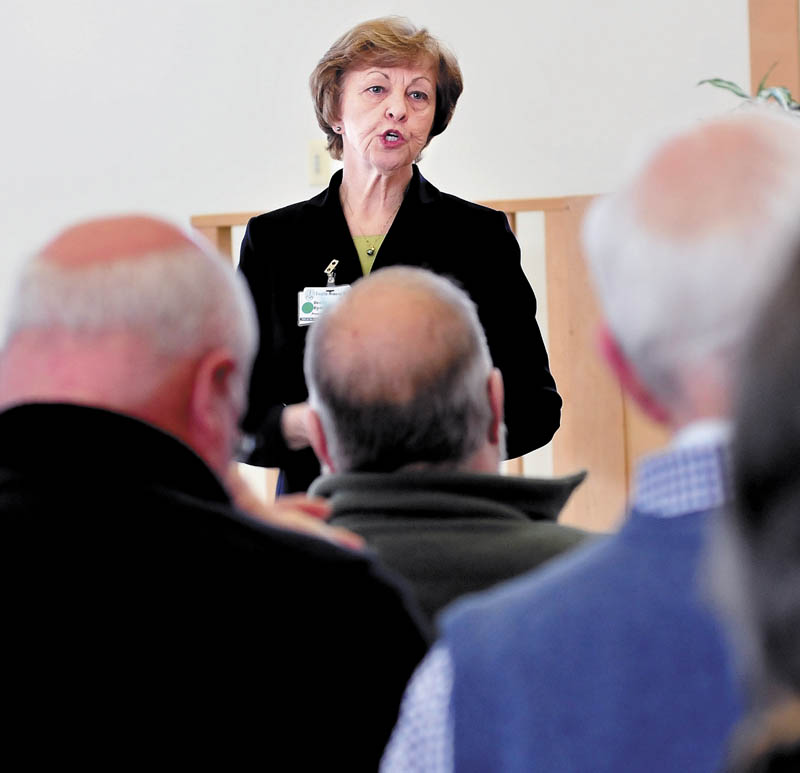FARMINGTON — Franklin Community Health Network, which operated last year with a larger deficit than predicted, is considering joining a larger health network and is continuing with initiatives such as a so-far successful move to significantly lower the number of non-emergency patients in the emergency room.
Those were among the topics up for discussion tonoight at the hospital system’s annual business meeting.
Rebecca Ryder, president and CEO of the health network, said in an interview earlier today that it’s the first time the hospital operated at a loss in more than a decade and she said the hospital immediately reacted to stem further losses.
The health network cut $6 million in expenses by eliminating 52 full-time positions, consolidating medical practices, renegotiating contracts and modifying the employee benefits package.
“We’re going to be OK,” Ryder said. “You have to look at your bottomline over a number of years. If you take it over a 10-year window, the hospital is still in good shape.”
The hospital ran at a $7.28 million loss the past fiscal year, which ended July 1. The health network announced in March that it had lost about $500,000 a month for the last seven months, and predicted operating at a $5.9 million loss if the pattern continued.
The network will also be switching the fuel source for its main buildings from heating oil to propane, which is expected to save $200,000 annually.
“We took immediate corrective action, because what no hospital organization can do is have those kind of losses year after year,” she said. “We had very clear targets, and we have met all of those targets.”
She said the biggest financial challenge the health network now faces is the government shrinking the amount it pays health care programs.
Ryder said the amount of charity care provided by the hospital has increased by $2 million over the past few years, while the state Legislature this session increased the tax paid by hospitals and reduced the amount of money it is paid for providing for MaineCare outpatient services. MaineCare is the state’s Medicaid program.
Ryder also said she anticipates the federal government will reduce the amount of MaineCare reimburses for services.
“Congress is going to have to figure out how to deal with the federal deficit situation and there are really only two places to look: health care and defense,” she said.
Ryder said if the Legislature decided to expand Medicaid for three years under the Affordable Care Act, it would help alleviate the growing burden on the health network from charity care.
Under the proposal, eligibility would expire after three years, when federal reimbursements for the program are scheduled to decline from 100 percent to 90 percent.
“For that to expand would make it even more challenging for the state, but the here and now is that the federal government will cover the cost of Medicaid expansion over the next couple of years and I see that as a transition period,” she said.
Because of the challenges the hospital is facing and continues to face, Ryder said the board of directors for the health network plan in the coming months is to weigh the benefits and costs that could come with joining a larger health system.
“This is going to be a thorough examination by the board. To just join another health system without thinking it through, understanding all of the information and identifying the benefits, would not be prudent on the board’s part,” she said.
The health network already collaborates with other networks on a service-by-service basis, Ryder said. For example, the radiology department works with Maine Medical Center in Portland and their records department works with Central Maine Medical Center in Lewiston.
“We know these people well. We work with these people every day,” she said. “The ultimate question will be, is a formal partnership with one something we want to examine?”
Despite the financial climate the hospital is operating under, Ryder said in the past year the hospital made significant progress.
Ryder said the network is trying to correct a cultural shift toward going to an emergency room for a medical problem such as a cough when it should instead be treated by a primary care medical provider.
“We have opened up slots in our primary care practices so if someone has a minor medical problem, they don’t need to be in the emergency room. They can call their doctors office and be seen that day,” she said.
Ryder said the network has reduced the emergency room use by 6 percent in the past year.
“We’re not paid nearly as much when somebody goes to the doctor’s office for the same thing, but it’s the right thing to do,” she said.
The network also plans to continue the “Choosing Wisely” campaign, which is an initiative to teach patients about choosing health care that is medically needed and supported by evidence, Ryder said.
“You might be surprised how many patients come to us and say, ‘My neighbor had the same problem and had a CAT scan, so now I need a CAT scan,” she said. “And how easy it would be for us to just say, ‘OK.’ But that’s not the right care.”
Kaitlin Schroeder — 861-9252
kschroeder@mainetoday.com
Send questions/comments to the editors.



Success. Please wait for the page to reload. If the page does not reload within 5 seconds, please refresh the page.
Enter your email and password to access comments.
Hi, to comment on stories you must . This profile is in addition to your subscription and website login.
Already have a commenting profile? .
Invalid username/password.
Please check your email to confirm and complete your registration.
Only subscribers are eligible to post comments. Please subscribe or login first for digital access. Here’s why.
Use the form below to reset your password. When you've submitted your account email, we will send an email with a reset code.